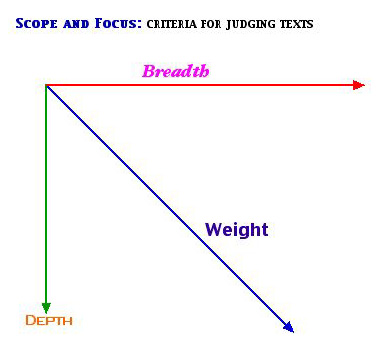
Use of multiple texts, (the value of)
mirror, facts, etymology, verity, interpretation, expression, critical reflection, questioning, method, summary.
 You may treat any text as a mirror
You may treat any text as a mirror
is interpretation a revealing of one's self
over - personalization should be avoided,
guide the students to avoid the pit of unconnected, idiosyncratic, unthematic opinions
| Categories | |||
|---|---|---|---|
| doxa | vs. | res | |
| meaning | |||
| examples | |||
| evidence | |||
| evidence | |||
mirror, facts, etymology, verity, interpretation, expression, critical reflection, questioning, method, summary.
facts
things that are indisputably the case : a body of one fact related logically to another fact.
• ( the fact that) used in discussing the significance of something that is the case.
• (usual facts) a piece of information used as evidence or as part of a report or news article.
• chiefly in Law the truth about events as opposed to interpretation.
ORIGIN, late 15th cent.: from Latin factum, neuter past participle of facere ‘do.’
The original sense was [an act or feat,] later [bad deed, a crime,] surviving in the phrase before (or after) the fact.
The earliest of the current senses ( [truth, reality] ) dates from the late 16th century.
mirror, facts, etymology, verity, interpretation, expression, critical reflection, questioning, method, summary.
To derive a measure of veritas from informing action with comprehending complex, even contradictory concepts.
1. Creates a habit of interpretation from practice of finding meaning.
2. Allows for personal connection to a universal concept.
3. Practice styles of negotiation in sharing meaning and discovering common verities.
"I ask questions that often do not have answers, because?" get a response:
a. It is college
b. Learning is not just conveying a string of answers
c. learning arises from interpreting what texts mean in their context.c.1 Personalizing the universals
c.2 making the experiences related to underlying universal themes
c.3 teasing out the significance of what a document, work, or passage speaks toAsk questions that don't have answers to because I want to be a participant in the learning process, and because the questions really worth asking are not easily answered and this gives us a more fundamental way of knowing.
mirror, facts, etymology, verity, interpretation, expression, critical reflection, questioning, method, summary.
I use the "interpretive mode" in my classroom situations and field study.
What is interpretation?
understanding and explaining the meaning of something in a recognized language
with accepted forms, themes or images.
Saying what something states, by digging deeper into:
mirror, facts, etymology, verity, interpretation, expression, critical reflection, questioning, method, summary.
Expression -- transferences and negotiation of meaning initially between me and myself
and eventually among others and me.
Can there be multiple meanings?
Absolutely, critical thinking only grows when there is a continual practice of
discovering what something says, does, or influences. Without an habituation of
asking questions that have few if any "absolute" answers" students are asked to
suspend decisions until the decision-making process is experienced as a search, an
accounting, a collateral examination, a means of practicing proof building based on
evaluation of competing evidence, examining contrasting ways of describing facts,
and dissecting arguments prior to coming to any conclusion about what is know, and
what remains to be discovered.
"destabilizing the background knowledge" so students reorganize the knowledge they already have unreflectively come into the experience with which may bias their learning.
mirror, facts, etymology, verity, interpretation, expression, critical reflection, questioning, method, summary.
So critical thinking arises only if there is an acknowledgement that there is no one single truth on some kinds of text, so that students can recognize either
1. The range of uncertainty from more to less certain
2. That the truth of something is related to the falsified quality of the parts
3. There is a dialectic at work in a wider fabric of knowledge
theme-- is like the warp -- the long threads of the loom
A theme needs to be controversial, relevant and destabilizing, question what we are sure about and how we know that for certain. This allows us to scrutinize unexamined assumptions.
Joan Kelly Hall, "the primary means by which learning occurs is talk."
Penn State U
Initiation
Response
Evaluation
or
IRA
mirror, facts, etymology, verity, interpretation, expression, critical reflection, questioning, method, summary.
Without an habituation of asking questions the curiosity needed to stimulate learning can be truncated, dwarfed, or stifled.
Because important questions that arise may have few if any "absolute" answers" students are asked to
1. suspend decisions until
2. the decision-making process is experienced asa) a search,
b) an accounting,
c) a collateral examination,
d) a means of practicing proof building based on1) evaluation of competing evidence,
2) examining contrasting ways off) describing facts, and
g) dissecting arguments prior to
h) coming to any conclusion about1. what is known, and
2. what remains to be discovered. Or
3. What remains unknown3.1 now
3.2 may be unknowable3. The dialectic is used but only to be surmounted, surpassed and engaged in a synthesis of crucial information emerges in several ways.
a. We realize there exist essential facts to know
b. There are contrasting interpretations to consider when engaging evidence
c. There are more than two ways (true or false) to affirm or deny the validity of evidence when used as:c.1 information or
c.2 interpretations and hence
c.3 the null-set is discovered as ac,3.a means of deepening or assuring concepts,
c,3.b qualifying or restricting what we know, or
c,3.c an enrichment of the cognitive capacity
mirror, facts, etymology, verity, interpretation, expression, critical reflection, questioning, method, summary.
elaboration -- to go on and make connections among like and unlike things.
clarification -- to state the boundaries of a discussion, foci, periphery and core.
To become so aware of what we are saying that we can change what we say to students so that they recognize a necessary ambiguity from a mere hypocritical duplicity, or debilitating cognitive disonance.
An example of this is ro understand and use "topic shifts" from form to function, to pieces, parts and wholes with different ends or purposes in an argument such as:
- practice,
- articulation, wh
- examination,
- self reflective thought, and
- revised taxonomy or classification.
Charles Darwin, Albert Einstein, Rachel Carson, Lynn Margulis, Murray Gell-Mann, Lewis Thomas, and James Lovelock all used such steps to revise and reveal such hidden knowledge that now revises our way of thinking about the unity of nature.
mirror, facts, etymology, verity, interpretation, expression, critical reflection, questioning, method, summary.
Mayr | Thomas | Wilson | Hardin | Darwin | Margulis | Steingraber | Carr | Keller | Watson